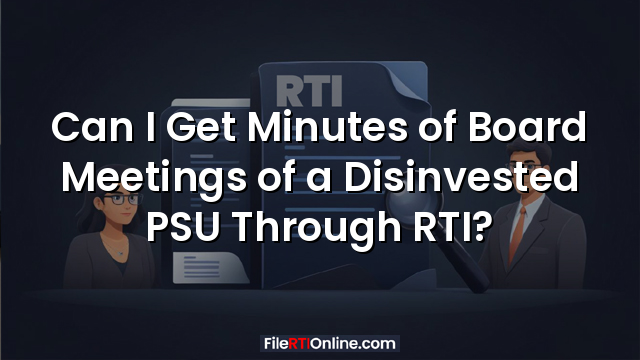Can I Get Minutes of Board Meetings of a Disinvested PSU Through RTI?
(Using the BALCO 233rd Board Meeting Case as an Example)**
Many RTI applicants wonder whether they can seek Board Meeting Minutes of companies that were once Public Sector Undertakings (PSUs) but were later disinvested. A common doubt is:
If the Government still has nominee directors on the company board, can I get Board Meeting Minutes through RTI?
The following case from the Central Information Commission (CIC) involving Bharat Aluminium Company Ltd. (BALCO) helps clarify this issue.
Background of the Case
An RTI applicant sought:
- Date of the 233rd Board Meeting of BALCO, and
- Minutes of that Meeting
from the Ministry of Mines (MoM).
How the PIO responded
The PIO denied the information citing:
- BALCO is no longer a public authority
After disinvestment on 2 March 2001, Sterlite Industries took management control.
Therefore, RTI Act does not apply to:- BALCO
- Sterlite Industries Ltd.
- Board Minutes are confidential
They contain:- Trade secrets
- Commercially sensitive decisions
- Internal business strategies
Such records are protected under the Companies Act, 1956, which does not permit public inspection.
- Government nominee directors have a fiduciary duty
Information they access as directors is not for public disclosure, as it may harm the company’s commercial interest. - Third-party confidentiality under Section 11(1)
Board minutes are supplied third party (BALCO) and are treated as confidential; hence disclosure is barred without their consent.
The First Appellate Authority also agreed with the PIO.
What Happened Before the CIC?
When the matter came before a Five Member Bench of CIC, Advocate Sen (representing BALCO/Sterlite) pointed out:
- The Chhattisgarh High Court had issued a stay order (dated 16.08.2011).
- This stay covered proceedings related to the subject matter, though not specifically under RTI.
- Therefore, CIC should not decide the matter until the High Court gives its final judgment.
CIC’s Decision
The Commission held:
Since a High Court stay is in force, CIC will not pass any order on merits.
The matter was:
- Adjourned sine-die (kept pending indefinitely)
- Applicant was given the liberty to approach CIC again after the High Court delivers its final decision.
What This Means for RTI Applicants
1. Board meeting minutes of disinvested PSUs are very hard to obtain
Companies where the Government holds only minority share or nominee directors are treated like private companies, not public authorities.
2. Board Minutes are usually protected as:
- Confidential third-party information (Section 11)
- Commercially sensitive (Section 8(1)(d))
- Protected under Company Law
3. Government nominee directors cannot disclose board secrets
They owe a fiduciary duty to the company, not to the public.
4. If a High Court has stayed the issue, CIC will not interfere
A stay Constitutional Court automatically restrains CIC from deciding the matter.
What You Can Still Ask For Under RTI
Even if minutes are not allowed, you may still request:
Whether government officials attended the meeting
Names/designations of government nominee directors
Whether government voted for/against a specific decision (sometimes allowed in public interest)
Copies of decisions where Government policy is involved (case-specific)
But complete board minutes of a disinvested company will usually be denied.
Summary
This BALCO case clarifies that:
- RTI does not automatically extend to private/disinvested companies, even if Government has nominee directors.
- Board minutes are highly protected due to commercial sensitivity.
- CIC will not act when a High Court stay is in force.
This precedent can guide applicants who are considering filing RTIs for corporate board records of partially-private or disinvested entities.


